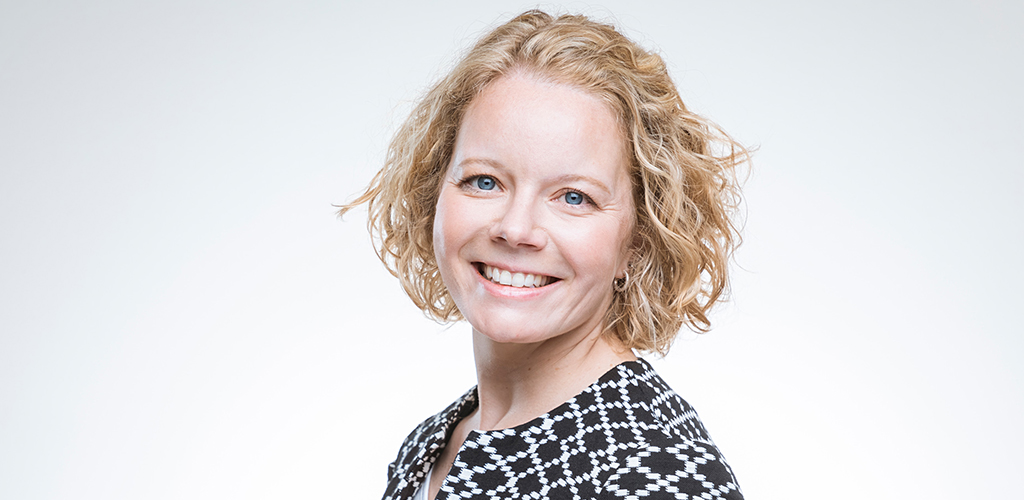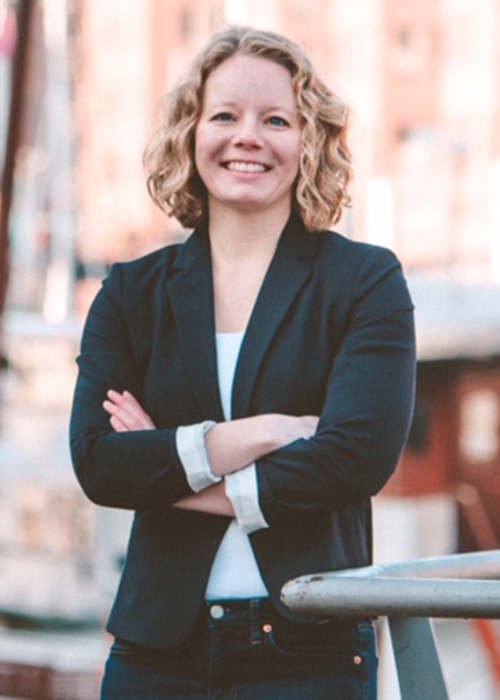Apr 27 | 2021
Looks to Grow Carrier’s Special Cargo Department

 By Felicity Landon
By Felicity LandonHow often do we hear that young people are simply not aware of the career opportunities in shipping? How fortunate, then, that Sarah Schlüter grew up near Hamburg.
“Whenever you wanted to go south you saw the container terminals in Hamburg, which always somewhat fascinated me,” said Schlüter, Hapag-Lloyd’s senior director of niche products, in an exclusive interview with Breakbulk. “Since Hamburg is also closely connected to shipping, it was a more obvious choice to go into this industry than is probably the case in many other parts of the world. The international scope of the business always excited me – learning about other cultures, understanding the drivers of global commerce and, of course, also having the chance to go abroad appealed to me.”
She joined Maersk as a shipping apprentice 20 years ago and stayed 12 years, taking on a range of roles mainly in trade management teams, from customer service to capacity management. “It was a case of being thrown in at the deep end and go and figure things out,” she recalled. “I was working at HQ and in regional centers.”
She decided to broaden her horizons and joined UASC, moving back to Hamburg to build up the Asia-Europe trade: “They had massive growth ambitions and I was busy setting up structures and processes, reviewing customer portfolios. Then after two years I went to Kuehne+Nagel, to the forwarding side. I felt it was important to have a more complete picture of our industry in total.”
Working on the buying/forwarding side enabled her to get to know all the shipping lines she was working with. “I learned that everybody knows what they are doing – they all just do it a little bit differently. That was very good exposure and knowledge. I learned appreciation for other carriers and what was or was not working for them, Schlüter said.
“After a year very much on the sea freight part, I moved on within Kuehne+Nagel to work on a transformation project, which took me into the whole IT/digitalization scope within the business. I wanted to do that because in the future shipping knowledge isn’t going to be enough to succeed in the long run – you also need to have IT knowledge and know how to optimize things. I did that for three years.”
The next move was to software company CargoSphere, but only for a short time. “During that year, I realized that my heart and my passion is in shipping. It sounds a bit cheesy, but it is the case. I started reaching out.”
Heady Combination
Schlüter joined Hapag-Lloyd in March 2020 as senior director, niche products, with global responsibility for reefer cargo, dangerous goods and special cargoes – including project, heavy and out-of-gauge cargoes.
She said a more natural role for her would have been in trade management, but she would not have had the opportunity to learn new things. Instead, the scope of her role is broad, combining the strategic side with operational, being customer facing and back end, building systems that improve the way Hapag-Lloyd operates and quotes to customers. “So, you can really combine everything. I have a great team and hopefully I am a good leader to them.”
Schlüter insists she is not a technical expert in any of the segments within her remit, “but I have my team for that. I think overall it is more important to understand the organization, processes, how to optimize things and how to be a good leader in motivating your people.”
Describing herself as a “generalist,” she added: “The old hierarchical approach is from the past – you don’t win over a lot of young people today with that style.”
What has changed in 20 years? Not everything, it seems. The shipping industry is still conservative in comparison with other industries, she said, but that’s not all negative.
“I truly believe that shipping is a people business – while you still have to make it as efficient as possible for everyone involved. It is still about being liked and trusted and your word counts, but the customers are not as forgiving as they were in the past – everything goes so much faster today. You need to run substantially faster than you did in the past, you need to be better with people and you need to be more professional.”
Twenty years on and the gender balance for leading positions in the industry is still lacking, she believes. “The shipping industry is still male dominated – it has absolutely not changed enough in the past 20 years. I can only hope that will change; it is up to me to help make that change, leading by example. It is really important to have diversity – a mix of male and female, and a range of nationalities – because the more diverse the team, the more perspectives and viewpoints you get.”
While diversity is improving, Schlüter sets a clear goal of at least three women in each team or, even better, an equal male/female gender balance. Without that, there will always be more focus on “doing things the male-dominated way.”
Younger people also need greater encouragement to join the industry. “If you want to work in an international industry with an ever-changing environment, I would definitely recommend working in shipping, regardless of if you are a man or woman. Shipping is not a traditional industry for women, but many industries are not and the chances to succeed become better and better, as slowly but steadily we see more females in senior management positions.”
Work and career paths in shipping have also morphed over the 20 years. Today’s generation are less likely to stick to one industry, or one career path for that matter, Schlüter said. “Also, ‘having a career’ might not be as important to them anymore, but rather being content with what they are doing. This might also lead them to switch around more and look more for work-life balance and a company that offers them what they are looking for.”
As for skillsets, having in-depth knowledge about shipping will be important, but so will more in-depth knowledge of IT and marketing, as job scopes become broader and broader and standardized jobs become automated, she believes. “Hence, only knowing shipping and having a closed mind to all other aspects of business and how it impacts people will not be sufficient.”
Digitalization Less of a Differentiator
From a strategic perspective, project cargo and breakbulk is run as a separate department at Hapag-Lloyd, with Schlüter’s department responsible for setting targets, budgets and pricing, as well as for processes, operational requirements and IT. Although it’s described as “niche,” growing the segment over the next few years is part of Hapag-Lloyd’s Strategy 2023. As part of that, the team is working on a web application to enable customers to go online and ask for rates for breakbulk and special cargo, offering more of a self-service option for customers.
 Processes should be more driven towards digitalization in order to make them as efficient as possible for both parties, Schlüter said. For example, artificial intelligence can help by predicting where equipment is going to be needed and what buffers are required according to vessel schedules, as well as supporting pricing and other factors.
Processes should be more driven towards digitalization in order to make them as efficient as possible for both parties, Schlüter said. For example, artificial intelligence can help by predicting where equipment is going to be needed and what buffers are required according to vessel schedules, as well as supporting pricing and other factors.However, she believes that very soon digitalization will not even be a differentiator, and that brings us full circle. “Digitalization will become so common that people will be the differentiator. You need to have a rapport with a customer and then you need to have the channel. I still think if the relationship between two people is not a positive one, it doesn’t matter what channel you offer or what digital solution. In the end, it is the people that make the difference – and the quality that you deliver. You must deliver what the customer has booked and agreed on, giving them confidence that this will happen.”
In the year ahead, Schlüter expects big projects to be slower because of the pandemic. Until Covid-19 is fully overcome, she thinks there will be continued impact on big investment projects, particularly in oil and gas.
In line with its plans for growth in the sector, Hapag-Lloyd has significantly expanded the team handling sales for special cargo, and is investing in new equipment, making internal changes and optimizing processes to accommodate special cargo better.
Needless to say, in the current container rush, vessel space is tight, especially for items that do not fit nicely into a standard rectangle shape. “Within the organization we all have to compete for the space – it is not just the customers!” Schlüter said. “Everyone has their own interest and we do have some tough internal discussions. But we do have support from the board for developing special cargo.”
Outside work, Schlüter’s hobby is Olympic weightlifting – fortunately she has been able to continue training throughout lockdown conditions. “I also love to travel, meet friends all around the world and explore new places – which will hopefully soon be possible again,” she said. And while she has no plans to leave the industry within the next 10 years, she has her pipedream of opening her own café serving cake and coffee to fall back on.
Felicity Landon is an award-winning freelance journalist specializing in the ports, shipping, transport and logistics sectors.
